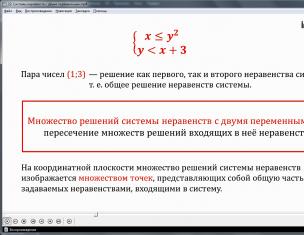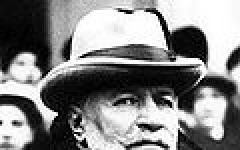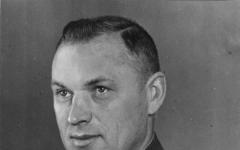Edouard Claparède(French douard Claparde; March 24, 1873, Geneva - September 29, 1940, ibid.) - Swiss neurologist, psychologist, one of the pioneers of child psychology, representative of functionalism. One of the founders of the Rousseau Institute, an international center for experimental research in the field of child psychology, as well as the founder of the International Society of Psychotechnics.
Biography
He graduated from the University of Geneva in 1892 with a bachelor's degree, and in 1897 he defended his doctorate in medicine. For a year he was engaged in clinical and experimental work at the Salpêtrière Hospital in Paris. Following the study of natural sciences and medicine, he devoted himself to psychology, which he studied with Théodore Flournoy, his close relative.
In 1901, E. Claparède and T. Flournoy founded the journal “Psychological Archive” (“Archives de Psychologie”), of which E. Claparède remained as editor until the end of his life. In 1904, E. Claparède became the head of the psychological laboratory founded by T. Flournoy, and in 1915 inherited the position of professor from him.
E. Claparède made a significant contribution to the international cooperation of psychologists through the activities of the International Psychological Congress. In 1908, E. Claparède took part in the first International Psychoanalytic Congress in Salzburg, and in 1912 he personally met S. Freud.
In 1912, E. Claparède founded the Rousseau Institute, which he conceived as a center for innovative research and practical developments in the field of education. Later, many of J. Piaget’s works were carried out here. In 1920, E. Claparède founded the International Society of Psychotechnics.
E. Claparède worked on problems of experimental psychology (especially sleep problems), clinical neurology, and zoopsychology. Subsequently, the interests of E. Claparède increasingly focused on the problems of the mental development of the child. Claparède's most famous work, Child Psychology and Experimental Pedagogy, published in 1905, has been translated into ten languages.
E. Claparède constantly insisted on the importance of the functional approach. He was always distinguished by unbiased judgments; he always tried to reveal the flexibility of human reactions in his interactions with the environment.
Edouard Claparède was married to Elena Shpir (1873-1955), daughter of the Russian philosopher A. A. Shpir.
Scientific activities
Publications in Russian
- Claparède E. Child psychology and experimental pedagogy. - M.: LKI, 2007.
Biography
E. Claparède made a significant contribution to the international cooperation of psychologists through his activities International Psychological Congress. In 1908, E. Claparède took part in the first International Psychoanalytic Congress in Salzburg, and in 1912 he personally met S. Freud.
E. Claparède worked on problems of experimental psychology (especially sleep problems), clinical neurology, and zoopsychology. Subsequently, the interests of E. Claparède increasingly focused on the problems of the mental development of the child. Claparède's most famous work, " Child psychology and experimental pedagogy", published in 1905, has been translated into ten languages.
E. Claparède constantly insisted on the importance of the functional approach. He was always distinguished by impartiality of judgment, he always tried to reveal the flexibility of human reactions in his interactions with the environment.
Edouard Claparède was married to Elena Shpir(1873-1955), daughter of the Russian philosopher A. A. Shpir.
Edouard Claparède died on September 29, 1940 in Geneva.
Scientific activities
Publications in Russian
- Claparede E. Child psychology and experimental pedagogy. - M.: LKI, 2007.
See also
Write a review of the article "Claparède, Edouard"
Notes
Links
Excerpt characterizing Claparède, Edouard
- Oh, you're just ruining everything for me. Well, go, go.Again everything fell silent, but Prince Andrei knew that she was still sitting here, he sometimes heard quiet movements, sometimes sighs.
- Ah... My God! My God! what is this! – she suddenly screamed. - Sleep like that! – and slammed the window.
“And they don’t care about my existence!” thought Prince Andrei as he listened to her conversation, for some reason expecting and fearing that she would say something about him. - “And there she is again! And how on purpose!” he thought. In his soul suddenly arose such an unexpected confusion of young thoughts and hopes, contradicting his whole life, that he, feeling unable to understand his condition, immediately fell asleep.
The next day, having said goodbye to only one count, without waiting for the ladies to leave, Prince Andrei went home.
It was already the beginning of June when Prince Andrei, returning home, again drove into that birch grove in which this old, gnarled oak had struck him so strangely and memorably. The bells rang even more muffled in the forest than a month and a half ago; everything was full, shady and dense; and the young spruces, scattered throughout the forest, did not disturb the overall beauty and, imitating the general character, were gently green with fluffy young shoots.
It was hot all day, a thunderstorm was gathering somewhere, but only a small cloud splashed on the dust of the road and on the succulent leaves. The left side of the forest was dark, in shadow; the right one, wet and glossy, glistened in the sun, slightly swaying in the wind. Everything was in bloom; the nightingales chattered and rolled, now close, now far away.
“Yes, here, in this forest, there was this oak tree with which we agreed,” thought Prince Andrei. “Where is he,” Prince Andrei thought again, looking at the left side of the road and without knowing it, without recognizing him, he admired the oak tree he was looking for. The old oak tree, completely transformed, spread out like a tent of lush, dark greenery, was melting, slightly swaying in the rays of the evening sun. No gnarled fingers, no sores, no old mistrust and grief - nothing was visible. Juicy, young leaves broke through the tough, hundred-year-old bark without knots, so it was impossible to believe that this old man had produced them. “Yes, this is that same oak tree,” thought Prince Andrei, and suddenly an unreasonable, spring feeling of joy and renewal came over him. All the best moments of his life suddenly came back to him at the same time. And Austerlitz with the high sky, and the dead, reproachful face of his wife, and Pierre on the ferry, and the girl excited by the beauty of the night, and this night, and the moon - and all this suddenly came to his mind.
“No, life is not over at the age of 31, Prince Andrei suddenly finally, permanently decided. Not only do I know everything that is in me, it is necessary for everyone to know it: both Pierre and this girl who wanted to fly into the sky, it is necessary for everyone to know me, so that my life does not go on for me alone So that they don’t live so independently of my life, so that it affects everyone and so that they all live with me!”
Returning from his trip, Prince Andrei decided to go to St. Petersburg in the fall and came up with various reasons for this decision. A whole series of reasonable, logical arguments why he needed to go to St. Petersburg and even serve were ready at his service every minute. Even now he did not understand how he could ever doubt the need to take an active part in life, just as a month ago he did not understand how the thought of leaving the village could have occurred to him. It seemed clear to him that all his experiences in life would have been in vain and would have been meaningless if he had not applied them to action and taken an active part in life again. He did not even understand how, on the basis of the same poor reasonable arguments, it had previously been obvious that he would have humiliated himself if now, after his life lessons, he again believed in the possibility of being useful and in the possibility of happiness and love. Now my mind suggested something completely different. After this trip, Prince Andrei began to get bored in the village, his previous activities did not interest him, and often, sitting alone in his office, he got up, went to the mirror and looked at his face for a long time. Then he turned away and looked at the portrait of the deceased Lisa, who, with curls whipped up a la grecque [in Greek], tenderly and cheerfully looked at him from the golden frame. She no longer spoke the same terrible words to her husband; she simply and cheerfully looked at him with curiosity. And Prince Andrei, clasping his hands back, walked around the room for a long time, now frowning, now smiling, reconsidering those unreasonable, inexpressible in words, secret as a crime thoughts associated with Pierre, with fame, with the girl on the window, with the oak tree, with female beauty and love that changed his whole life. And at these moments, when someone came to him, he was especially dry, strictly decisive and especially unpleasantly logical.
Swiss psychologist, professor at the University of Geneva (1908). One of the founders of the Pedagogical Institute named after. J.J. Rousseau in Geneva (1912) and the journal "Archives of Psychology" (1902). Continuer of the traditions of the French school of empirical psychology. Author of works devoted to the connection of psychology with clinical and pedagogical practice, issues of career guidance, etc. K.’s theory of child play, close to the biological concept of K. Grosz, but with greater reliance on psychological content (for example, in assessing needs), became famous.
Excellent definition
Incomplete definition ↓
CLAPAREDE Edouard
24.3. 1873, Geneva, - September 29, 1940, ibid.), Swiss. psychologist, prof. University of Geneva (since 1908). One of the founders of the pedagogical institute named after. J. J. Rousseau in Geneva (1912) and journal. "Archives de Psychologie" (Archives of Psychology, 1902). Continuer of the French traditions. schools of empirical psychology (T. Ribot, P. Janet, A. Biney, etc.). K. asserted the activity of consciousness, highlighting the role of interests, motives and needs in behavior. In works devoted to the connection between psychology and clinical. and ped. practice, K. showed the importance of knowledge of psychology and for successful education. influence on the character, will and other aspects of the individual, and for organizing the learning process. K. introduced into ped. practice method so-called thinking out loud, in which the student, solving a difficult problem for himself, talks about the progress of the search for a solution. K. dealt with issues of career guidance, warning against excessive reliance on tests when predicting learning outcomes. Paying great attention to the study of the child’s psyche, K. put forward a number of important ideas about qualitatively different levels in the ontogenesis of the process of generalization, about the relationship between awareness of differences and awareness of similarities, etc. These ideas had a significant impact. influence on modern zarub. genetic psychology, in particular the theory of J. Piaget. K.'s theory of child play, which is close to biol., became famous. concepts of K. Gross, but with greater reliance on psychology. content (eg needs assessment).
Works: Lassociation des idees, R., 1903; Leducation fonctionnelle, Nchat. - R., P931]; Le sentiment dinferiorite chez lenfant. Cahi-ers de pedagogie experimentale et de Psychologie de lenfant, Gen., 1934; in Russian lane - Child psychology and experimentation. pedagogy, St. Petersburg, 1911; Prof. orientation, its problems and methods, M., 1925; How to determine the mental abilities of schoolchildren, L., 1927.
Scientists have been studying the specifics of the mental state of children since the classical period. But scientists of the late 19th century showed especially great interest in this. During this period, developmental psychology began to be recognized as an independent field of psychological science. One of the scientists who dealt with problems in this area was E. Claparède.
– Swiss neurologist, psychologist, teacher, representative of functionalism. Born on March 24, 1873 in Geneva. He studied at the University of Geneva and became a doctor of medicine. After that I began to study psychology. He received his second education at the university of his relative Theodore Flournoy. Together with Flournoy in 1901, he created the journal Psychological Archive. Claparède was the editor of this magazine until 1940.
In 1904, E. Claparède headed a psychological laboratory. After the death of T. Flournoy he became a professor.
Claparède studied experimental psychology, clinical neurology, and zoopsychology. As a result, his attention became increasingly focused on the problems of the child’s psychodevelopment.
Edouard Claparède created his theory of self-development. Sharing Stanley Hall's ideas about the need to create pedology, Claparède did not accept his explanation of the biogenetic law. He thought that widespread similarities between species and individual development of the psyche exist because there is a universal logic of the expansion of the psyche in phylogeny and ontogeny. Actually, this compatible logic of development recognizes the similarity of processes (and not their identity!). Thanks to this, there is no inevitable predetermination in the upbringing of a child, and external reasons (for example, training) can hasten his development and even half deform the direction.
E. Claparède advised to distinguish child psychology into theoretical and practical (applied), suggesting that they have a different range of problems. Establishing the laws of psychological life and stages of psychological development of children was the main goal of theoretical child psychology. Applied child psychology, in turn, was divided into psychognostics and psychotechnics. The main goal of psychognostics was diagnosis, recognition of the mental ontogenesis of children, the goal of psychotechnics was the creation of means of training and education.
Believing that psychological ontogenesis does not need auxiliary motives or circumstances that would encourage it, Claparède perfected the idea of self-development, the self-appearance of those rudiments that a child already has at birth. Play and imitation are the mechanisms of this development.
Of all the problems that interested Claparède, he paid more attention to thinking and the stages of its ontogenesis in children. Claparède practically identified the ontogenesis of thinking with psychological development, so the criterion for dividing childhood into stages for him was the degeneration from one form of thinking to another. He identified 4 stages in psychological ontogenesis.
Stage 1 - from birth to 2 years. At this stage, children are dominated by curiosity about the external side of objects, and therefore mental development is connected in an important way with the ontogenesis of perception.
Stage 2 begins at age 2 and lasts until age 3, during which time children's language improves and their cognitive interests are therefore focused on words and their meanings.
The 3rd stage - from 3 to 7 years - is associated with the beginning of mental development itself, while joint mental interests predominate in children.
The 4th stage lasts from 7 to 12 years, during this period the individual characteristics and inclinations of children begin to appear and develop, because their mental development is combined with the formation of special objective interests.
Analyzing the formation of the mental sphere of children, Claparède discovered one of the most important properties of puerile thinking. This property is syncretism, i.e. not fragmentation, the unity of children's understandings about the world. Claparède argued that psychological ontogenesis moves from capturing the appearance to naming an object (verbal stage), and then to mastering its role, which is already the result of the ontogenesis of logical thinking. L.S. later spoke about the same direction in the development of children’s thinking - from unity to dismemberment. Vygotsky, challenging V. Stern’s assertion that the child first understands a part (a single object) and only then begins to connect the individual parts into a holistic image of the world.
As a result of the fact that the ontogenesis of abilities is determined by inherited factors. Claparède distinguished cumulative and special giftedness, moreover, general giftedness is revealed, in his opinion, at an immature age and is combined with a single (high) level of all the intellectual characteristics of the child. Claparède attributed giftedness in a one-sided sense to a developed age and combined it with a person’s talent to solve unusual problems.
To summarize, we can say that Edouard Claparède laid the foundations of developmental psychology as a special branch of psychological science, ensuring a close connection between psychology and pedagogy. Thus, he had a great influence on the understanding of the application of psychological knowledge in teaching and raising a child.
List of sources
1. History of psychology in persons: personalities, ed. A.V.Petrovsky, editor-compiler L.A. Karpenko. - M.: PER SE, 2005.
2. Kondakov I.M. Psychology. Illustrated Dictionary. - St. Petersburg: Prime-Eurosign, 2003.
3. Eduard Claparède // Calendar of events. – URL: http://www.calend.ru/person/4002/ (access date: 12/15/2013).
Edward Claparede
Born: 1873, Geneva, Switzerland.
Died: 1940, Geneva, Switzerland.
Interests: applied psychology, developmental psychology, educational psychology, mental retardation.
Education: Doctor of Medicine, University of Geneva; 1897.
Edward Claparede was born and spent most of his life in Geneva. Following the study of natural sciences and medicine, he devoted himself to psychology, studying with and subsequently collaborating with Theodore Flournoy, a close relative of his. Claparede succeeded Flournoy as professor of psychology at the University of Geneva in 1915 and held this post until his death. In the field of psychology, he had a wide range of interests, including topics such as sleep, intelligence, problem solving and education. In addition, he was interested in neurology and psychiatry. In addition to theoretical, experimental and applied work in psychology, Claparede devoted a lot of time to his professional and administrative duties. Together with Flournoy, he founded the journal Archives de Psychologie and made a significant contribution to the international cooperation of psychologists through the activities of the International Psychological Congress. In addition, in 1912 he founded the Institute J. J. Rousseau, which he conceived as a center for innovative research and practical developments in the field of education. Later, many of Jean Piaget's works were carried out here.
Claparede always insisted on the importance of a functional approach. For example, when dealing with sleep problems, he considered it as a functional state that meets the needs of the body and protects it from fatigue. Claparede proved that sleep must be accompanied by active inhibition, carried out due to control by the nervous system. Refusal of contacts with the outside world (and this is precisely the situation observed, as assumed Claparede, and in the case of hysteria) must have functional causes. Accordingly, the idea of contact between the organism and the environment occupied a central place in the worldview Claparede and conceptually brought him closer to pragmatism, which is clearly demonstrated in his “Law of Becoming Conscious” - “the law of conscious development.” Law Claparede entails a number of consequences. It follows from it that mental activity does not affect consciousness as long as the body successfully carries out its functions. Like instincts, cognitive processing can also be carried out effectively without the involvement of consciousness. Only if the environment puts forward new demands will mental processes be “intercepted” by knowledge. The acquired experience can subsequently be used to solve problems and adequately evaluate the action performed. This dynamic approach to consciousness emerged from the combination of psychoanalysis and comparative psychology. He gave birth to an experimental method in which the subject must tell a scheme for solving a problem. Thanks to this method, research Claparede There are some features of cognitive psychology, which arose much later.
Second aspect of the law Claparede- this is a development problem. Claparede argues that processes inherent in the earliest stages of development, the awareness of which is not necessary, are the last to be “intercepted” by consciousness. He wrote: “The earlier a connection begins to be used, and the longer it is used, the later its conscious perception occurs.” As a main example, he cited the perception of similarity. Thus, the child’s actions are based on the similarity of objects and situations, but the awareness of similarities occurs much later than the awareness of differences. This hypothesis, as well as other aspects of the law Claparede and his other theories, attracted the close attention of Piaget. Its implications seem somewhat provocative, since if we could agree on which phases of development are the latest (and most mature), it would offer tantalizing possibilities for understanding the phenomenon of childhood. Connecting logic, for example, could be regarded as the last stage of awakening consciousness. If this is so, then, according to the consequences of the law Claparede, the unconscious use of logical mechanisms must be one of the earliest cognitive abilities. It should be emphasized that Piaget’s works do not completely exhaust the law of developing consciousness Claparede, nor his other assumptions. Really, Claparede takes a more dynamic, open approach to the problem of cognitive development than his younger colleague. Claparede always distinguished by impartiality of judgment, he always tried to identify the flexibility of human reactions in his interactions with the environment.







